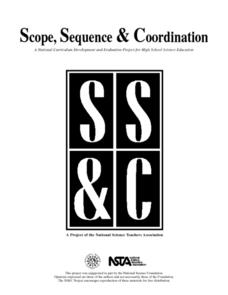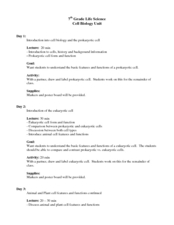Curated OER
Condensation Polymerization: Preparation of Two Types of Polyesters
College-level or AP chemists use phthalic anhydride to synthesize two different polyesters, one linear and one cross-linked in structure. A detailed materials list and well-written procedures are provided on a lab sheet. Learners write...
Curated OER
Investigation of Crystallinity in Polymeric Materials
A kaleidoscope is constructed using polarizing polymer paper and then low-density polyethylene, high-density polyethylene, and polypropylene are all melted onto individual glass slides and examined through a microscope. The intent is to...
LABScI
Atomic Structure and the Periodic Table of Elements: The Secret Agent Lab
Food always gets attention! Model atomic structure using fruit loops to represent the subatomic particles. After building models, scholars create ionic bonds using their models. Finally, they use these concepts to create a periodic...
Curated OER
New York City Water Quality Assessment Project
Students investigate the chemistry of water and how its molecular structure supports life through its biochemcial, physical, and environmental roles. They investigate the quality of water as it interacts with the environment. Students...
Curated OER
Playful Polymers
Eighth graders investigate polymers and their structures. In this polymers instructional activity, 8th graders perform 6 activities to learn about polymers and their molecular structure. They categorize a bag of items as polymers and...
Curated OER
Properties of Useful Carbon Compounds
Nine action-packed organic chemistry exercises are contained in this mini-unit on carbon containing compounds. Examples include constructing models of alkanes, producing aromatic esters, and preparing pigments for paint and dyes....
Curated OER
The Effect of Natural Selection on Genes, Traits and Individuals
Rotating through five stations, evolutionary biologists explore the question of how changes in DNA facilitate the changes in a population over time. High-quality, colorful cards of animals, skeletons, skulls, and DNA sequences can all be...
Curated OER
Strawberry Smoothies
Biologists extract the DNA from a strawberry. After completing the procedure, learners write answers to a few questions on the lab sheet provided. This is ideal lab practice during a DNA unit in your general biology course.
Curated OER
Biomolecules
Students perform an experiment in which they test foods for the presence of proteins, carbohydrates, and lipids. They identify the molecular structure of each type of biomolecule and then discuss how biomolecules relate to nutrition and...
Curated OER
Chemical Resistance and Synthetic Polymers
Students participate in lab activities in which they examine immersion, stain resistance, and stress cracking of synthetic polymers. Students use their collected data to discuss service applications and possible performance of materials.
Curated OER
What Are The Properties of Sea Water?
Ninth graders conduct research on the subject of sea water. They use a variety of resources to obtain information. There are helpful resource links listed in the activity. In conjunction with the research students make inquiry of the...
Curated OER
The Cytochrome-C Lab
Students examine a method biologists use to try to determine relationships. They examine how amino acid sequences have been determined for a number of proteins, and how scientists can make inferences about DNA based on the amino acid...
Curated OER
Constructing a Phylogenetic Tree
Students are given the opportunity to analyze DNA sequence differences between organisms in order to establish a reasonable picture of the evolutionary relationships between them (Phylogenetic Tree). In the simulation form they are...
Curated OER
Cell (Biology)
Students conduct a series of activities to explore the nature of cells. In this biology lesson, students observe plant and animal cells under the microscope and compare them. They differentiate osmosis and diffusion.
Curated OER
Indirect Observation
Students observe obscertainers through indirect observations and make hypotheses about the internal wall structures of the containers. In this indirect observation lesson plan, students make observations of 4 obscertainers with a steel...
Curated OER
Identification of Animals by Serum Electrophoresis
Students compare their unknown serum against a set of known serum standards and determine the animal source of their serum. They write a lab report to communicate their results.
Curated OER
How Genes Work Lesson Plan
High schoolers define the key terms that are the structure and function of DNA. In this genetics lesson students complete a lab activity in which they construct a model DNA structure.
Curated OER
What's the Big Deal?
Students explore and define methane hydrates and describe ways that it can impact their own lives. In this methane hydrate lesson students create a molecular model and research methane hydrate.
Curated OER
Mystery Polymers
Students examine how some natural substances are polymers. In this polymer lesson students complete a lab and give examples of a physical change.
Curated OER
Relationships and Biodiversity
Students examine diversity on the planet and the differences within a species. In this investigative instructional activity students complete a lab that allows students to better understand the relatedness between plants.
Curated OER
Proteins Expressed At Different Stages
Students investigate protein electrophoresis in a lab setting. Full laboratory equipment is needed and safety should be taught. The level of prior knowledge needed to perform lab is high and is ideal for an honors class.
Curated OER
Slime and Intermolecular Attractions
Students explore the strength of intermolecular attractions. They make slime and compare the difference in the physical properties of sheet and powdered polyvinyl alcohol with polyvinyl acetate.
Curated OER
Tie Dye
Students practice writing research proposals to test the color fastness of a dye once it has been exposed to a t-shirt. Each proposal needs details of experimental design, length of treatment, and means of cleaning the shirt. All...
Curated OER
The Great Cafeteria Caper
Learners extract DNA from their own hair roots. They run an electrophoresis gel to examine patterns of their DNA along with standard DNA. The experiment is based on a crime scene scenario.























